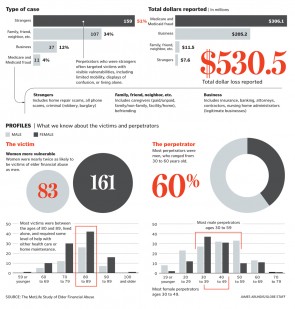
Elder financial abuse
Researchers analyzed media reports from April through June 2010, and pinpointed 314 unduplicated reports of elder financial abuse that included detailed information. Source Metlife Study on Elder Financial Abuse. Credit: James Abundis, Boston Globe.
By Kay Lazar | The Boston Globe | January 6, 2014
Roughly 21,000 times last year, physicians, social workers, family members, and other concerned residents contacted Massachusetts Protective Services authorities to report suspicions that an elderly person was being abused.
In about one third of those cases, the concern involved financial exploitation, according to state officials, a problem that is expected to grow significantly as the population ages and the number of older adults left vulnerable by Alzheimer’s disease nationwide is projected to double, and perhaps triple, by 2050.
With a potential tsunami of elder financial abuse on the horizon, researchers, health care leaders, lawyers, and lawmakers have launched a number of initiatives to better understand the size and scope of the issue and craft strategies to minimize harm.
“My expectation is that exploitation will be a growth industry,” said State Representative Paul Brodeur, a Melrose Democrat and former general counsel to the Massachusetts Executive Office of Elder Affairs. Brodeur successfully lobbied for the creation of a special state commission to investigate and make recommendations to Governor Deval Patrick’s administration for beefing up elder protective services.
Brodeur said the panel’s report, expected in January, will likely include a proposal to establish volunteer teams of financial experts, such as financial planners and bankers, who can be tapped to help overwhelmed protective services staffers untangle financial scams against the elderly.
Read the full article at The Boston Globe.
Also, watch the CLBB panel event on “Capacity, Finances, and the Elderly”, held December 12, 2013, moderated by Kay Lazar, and featuring Dr. Brendel, Susan Stenger, Judge Susan Ricci, and CLBB co-director Bruce H. Price, MD.



